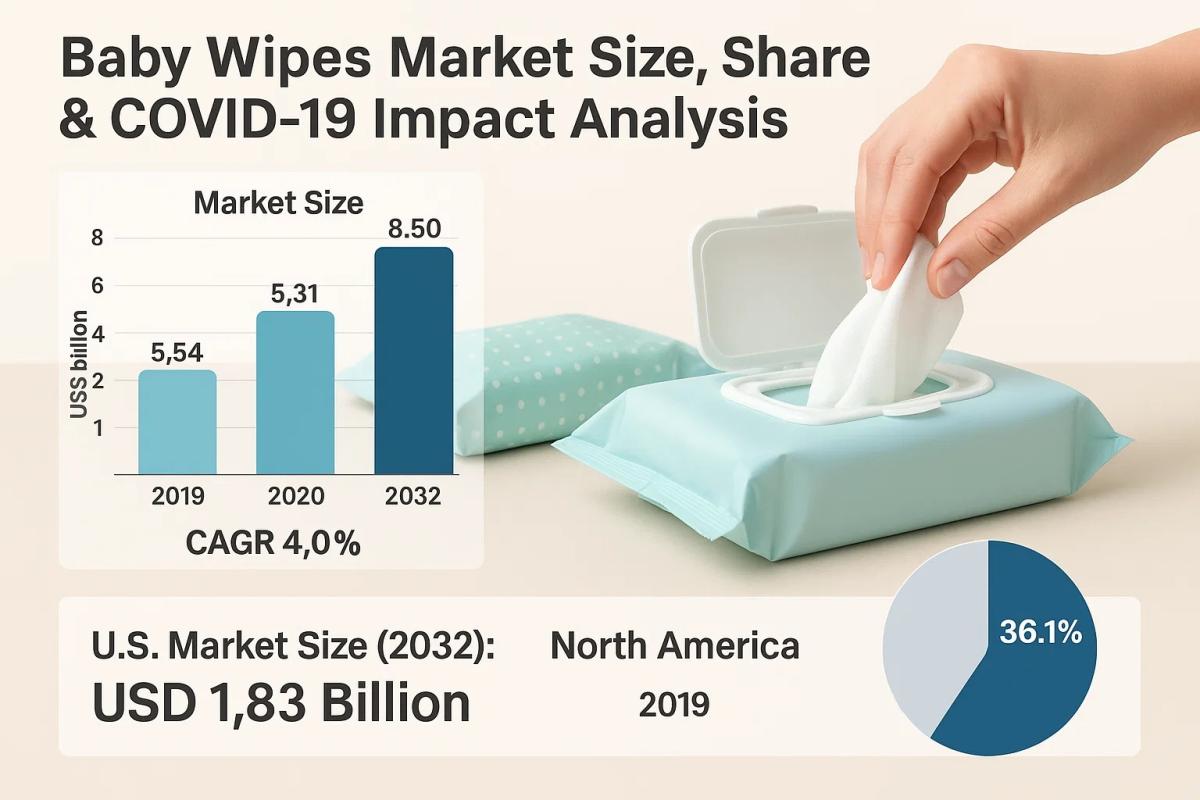Baby Wipes Market Growth Insights, Key Trends & Forecast 2025–2032
According to Fortune Business Insights, the global baby wipes market size was valued at USD 5.54 billion in 2019 and is projected to grow from USD 5.31 billion in 2020 to USD 8.50 billion by 2032, exhibiting a steady CAGR of 4.0% during the forecast period. Rising awareness of infant hygiene, increasing demand for eco-friendly and hypoallergenic wipes, and strong consumer preference for convenient baby care solutions are key factors driving market growth.
In the U.S., the baby wipes market is forecasted to reach USD 1.83 billion by 2032, while North America dominated the global market with a 36.1% market share in 2019. Globally, rising disposable incomes, a growing infant population, and an increasing number of working mothers are fueling adoption.

Get FREE Sample Copy of Baby Wipe Market Report: https://www.fortunebusinessinsights.com/enquiry/request-sample-pdf/baby-wipes-market-104550
Key Market Insights
2019 Market Value: USD 5.54 billion
2032 Forecast Value: USD 8.50 billion
CAGR (2020–2032): 4.0%
Regional Leader: North America (36.1% share in 2019)
U.S. Forecast: USD 1.83 billion by 2032
Japan Forecast: USD 239.96 million by 2025
India CAGR: 6.09% (strongest growth in Asia Pacific)
Market Trends
North America witnessed baby wipes market growth from USD 1.93 billion in 2018 to USD 2 billion in 2019.
Sustainable Packaging: Companies like Nice-Pak International launched recyclable packaging for wet wipes in the U.K. to reduce environmental impact.
Customization & Premium Products: Growth in fragranced wipes with natural ingredients such as aloe vera and honey.
Travel-Friendly Packs: Rising adoption of small travel packs for convenience and disposability.
E-commerce Expansion: Platforms such as Amazon, Babyshop, and FirstCry are fueling online sales growth.
Baby Wipes Market Growth Drivers
Rising Infant Hygiene Awareness
Parents are increasingly conscious of safe ingredients in baby care products, boosting demand for gentle, natural, and chemical-free wipes.
Eco-Friendly and Biodegradable Wipes
Brands are innovating with plant-based and biodegradable wipes to meet consumer demand for sustainable solutions. For instance, Nature’s One launched plant-based wipes with moisture absorption technology in 2020.
Skin Health Concerns in Babies
With diaper rashes, eczema, and allergies affecting infants worldwide, demand for disinfectant and soothing baby wipes is growing. According to the U.S. National Library of Medicine, 14.9% of infants in Germany suffered from diaper dermatitis in 2019.
COVID-19 Impact – Stockpiling & Hygiene Focus
During the pandemic, parents stocked up on baby care and personal hygiene products, boosting sales through supermarkets and online channels. Remote working also allowed parents to spend more time on child care, supporting market demand.
Market Restraints
Counterfeit Products: Presence of low-quality wipes with harmful chemicals like parabens and sulfates threatens consumer trust.
Substitute Products: Use of toilet paper and tissues as cheaper alternatives may limit demand.
High Cost of Premium Products: Limits adoption in low-income groups.
Baby Wipes Market Segmentation
By Product Type
Wet Wipes – Largest segment, projected to hold 58.94% market share by 2025.
Dry Wipes – Gaining popularity due to ease of disposal and travel convenience.
By Packaging
Pouch/Box – Expected to generate USD 4.12 billion by 2025, driven by portability and refill options.
Tube/Tin – Increasing adoption in schools, hospitals, and commercial spaces.
By Distribution Channel
Hypermarkets & Supermarkets – Largest segment due to wide availability and bulk purchase discounts.
Online Stores – Fastest-growing channel, driven by rising digital adoption and quick delivery options.
Pharmacies & Others – Contribute steady demand for daily baby care products.
Regional Insights
North America: Valued at USD 2.0 billion in 2019, supported by higher purchasing power, disposable hygiene penetration, and strong childcare subsidies (USD 8.3 billion allocated in the U.S. in 2019).
Europe: Expected to grow at 2.52% CAGR, led by major players such as Beiersdorf AG, Rockline, and Codi Group. Strong marketing initiatives, such as WaterWipes’ Early Day Club campaign in the U.K., are boosting engagement.
Asia Pacific: Rapid growth fueled by innovations in wipes design in China, India, and Japan. Kimberly-Clark’s USD 18 million investment in Singapore to double plant-based wipes output highlights regional momentum.
South America: Rising adoption of wipes and diapers as premium lifestyle products in Brazil is driving growth.
Middle East & Africa: Growing online presence of baby care brands (e.g., PureBorn’s UAE e-commerce launch) is supporting sales.
Get Full Summary here: https://www.fortunebusinessinsights.com/baby-wipes-market-104550
Key Players in the Baby Wipes Market
Leading companies are focusing on sustainable formulations, plant-based raw materials, and attractive packaging to expand market share. Prominent players include:
List of Top Baby Wipes Companies:
Procter & Gamble Co. (Ohio, U.S.)
Johnson & Johnson (New Jersey, U.S.)
Kimberly Clark Corporation (Texas, U.S.)
Pigeon Corporation (Tokyo, Japan)
Hengan International Group Company Limited (Quanzhou, China)
Unicharm Corporation (Tokyo, Japan)
CPMC Holdings Ltd. (Santiago, Chile)
Nice-Pak International Limited (New York, U.S.)
Beiersdorf AG (Hamburg, Germany)
ALBAAD (Masu’ot Itzhak, Israel)
Key Industry Developments:
May 2021 – Coterie Baby Inc. collaborated with Veocel, a hygiene products’ maker, to launch a new baby wipe in the U.S. market. Such a product is made up of 100% plant-based and biodegradable materials.
April 2021 – The ALBAAD GROUP, a European leader in manufacturing hygiene products, invested USD 60.29 million to expand its manufacturing capacity and produce environmentally friendly cosmetics and wet baby wipes.
The baby wipes market is set for steady growth through 2032, driven by eco-friendly innovations, rising infant hygiene awareness, and expansion of online retail channels. While counterfeit products and substitutes may pose challenges, leading brands are focusing on premium, plant-based, and customizable wipes to capture growing demand from health-conscious parents worldwide.